The Revolution Europe Needs
The "Yellow Vest" protests in France over the past month have been compared to the historic revolt of May 1968, when students and workers almost brought the French economy to a halt in the name of political and cultural reform. But unlike its precursor, today's uprising is not so much an exercise in democracy as an attack against it.
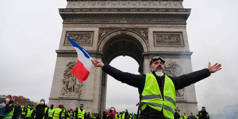
Will the Yellow Vests Reject the Brown Shirts?
Now that President Emmanuel Macron has retreated in the face of France's grassroots protest movement, the ball is in the protesters' court. The danger is that they will place themselves in the tradition of paranoid nihilism and pollute their ranks with the political vandals that France still produces in abundance.
PARIS – From the moment the French government canceled its planned fuel tax hike in the face of massive protests, it was obvious that the move would be perceived as inadequate, insignificant, and above all incapable of having any calming effect. Honor to whom honor is due: the Yellow Vests claim to be an expression of the sovereign people. But they now bear a heavy responsibility.
For starters, they must announce a moratorium on demonstrations and blockades for a period long enough to accommodate the dialogue proposed by Prime Minister Édouard Philippe, if not longer. In particular, they should renounce the much-touted December 8 “Act IV” of the movement, brewing on Facebook since Saturday evening, which everyone expects to be more violent, destructive, and tragic than the preceding installments. There have been enough deaths, injuries, and damage (including to some of the most famous monuments in Paris).
If the Yellow Vests decide the machine they have unleashed has overtaken them, and they can no longer stop Act IV, they must be prepared during the protests to help the police flush out the violent “brown vests” who will be circulating among them. Because the wreckers of the far right and far left will surely reappear to vandalize, terrorize, and desecrate; it is up to the Yellow Vests to say once again, this time as if they really mean it: Not in our name. Whether the Yellow Vests declare a moratorium or continue to protest, nothing would serve their cause better than to dissociate themselves – decisively and unambiguously – from all the political profiteers who would capitalize on their misery.
The cast of opportunists is well known. Here is Jean-Luc Mélenchon, who, having finished fourth in the 2017 presidential election won by Emmanuel Macron, is desperately seeking a new following. There is François Ruffin, the leader of the anti-austerity movement Nuit debout, with his irresponsible anti-republican calls of “Resign, Macron!” And over there is Marine Le Pen, oscillating comically between taking pride in and repenting her call to occupy the Champs Élysées last Saturday, thereby becoming accountable for the worst of what was said and done there.
And there the intellectuals who, in the manner of Luc Ferry and Emmanuel Todd, suggest that it was perhaps not “by chance” that the wreckers had such an easy time approaching, storming, and sacking the Arc de Triomphe. Such rhetoric lays the worst of all traps for a popular movement: the trap of conspiratorial thinking.
In other words, the Yellow Vests are at a crossroads. Either they will be bold enough to stop and take the time they need to get organized, following a path not unlike that of Macron’s own La République en Marche !, which, in hindsight, might appear to be the Yellow Vests’ first-to-arrive twin. Macron’s movement, too, had right and left wings. And it knew that it was a new political body, engaging in a dialogue or even a showdown that would lead to an honest reckoning with poverty and the high cost of living. If the Yellow Vests build a movement that rises to the height of Macron’s, it may end up writing a page in the history of France.
Or the Yellow Vests may turn out to lack that boldness and settle for the paltry pleasure of being seen on television. They will allow themselves to become intoxicated by the sight of luminaries and experts of la France d’en haut (elite France) seeming to eat from their hands and hanging on their every word.
But if the Yellow Vests allow passionate hate to win out over genuine fraternity and choose wrecking over reforming, they will bring only chaos, not improvement, to the lives of humble and vulnerable people. They will careen off into the darkest side of the political night, and end up in the dustbin of history, where they can rub elbows with those other yellows, the early-twentieth-century “Yellow Socialists” of the proto-fascist syndicalist Pierre Biétry.
The Yellow Vests must choose: democratic re-invention, or an updated version of the national socialist leagues; a will to repair, or the urge to destroy. The decision will hinge on the historic essence of the movement – whether its reflexes are good or bad, and whether, in the final analysis, it possesses political and moral courage.
So the ball is in the Yellow Vests’ court. They have the initiative as much as Macron does. Will they say, “Yes, we believe in republican democracy?” And will they say it loud and clear, without equivocation? Or will they place themselves in the tradition of paranoid nihilism and pollute their ranks with the political vandals that France still produces in abundance?
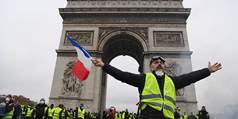
The Yellow Vests Are Here to Stay
Although the recent attack on a Christmas market in Strasbourg, France, has sapped some of the energy from the Yellow Vest protests, the root causes of French voters' discontent remain. At issue is not the need for reform, but rather the costs – and who should bear them.
WARSAW – The terrorist attack on a Christmas market in Strasbourg, France, on December 11 came after a month in which the “Yellow Vest” protests in Paris and other cities dominated international headlines. French police have since tracked down and killed the attacker in a shootout, and an old law of politics holds that the French will now rally behind President Emmanuel Macron – at least for the time being.
That is what happened after the attacks on the offices of Charlie Hebdo in 2015, when then-President Francois Hollande’s declining popularity was momentarily reversed. It also helps to explain how Vladimir Putin, previously an unknown entity, cemented his power in Russia following a series of bombings in 1999. Of course, in that case, investigative journalists have marshaled ample evidence to suggest that the government orchestrated the attacks to bolster its public support.
Although the Yellow Vests’ protests continue, tempers have cooled, providing a respite to Macron. But the movement’s socioeconomic roots remain. As anyone remotely familiar with French history knows, the competing forces of revolution and Bonapartism have long driven political outcomes. Macron owes his presidency to the latter. The French were attracted to the young reformer’s European triumphalism, not because they are particularly fond of the European Union (they aren’t), but because it seemed to augur a return of French imperial grandeur.
But it didn’t take long for the specter of revolution to return. Clearly, Macron misunderstood his own success. He was wrong to assume that French voters elected him to reform the EU. Though the French yearn for national greatness, they abhor economic pauperization in equal measure. Macron should have directed his attention to the latter issue. Instead, he launched a series of reforms that stoked the resentment of the masses.
Owing to his elitist self-presentation and personal background, Macron already looked like a representative of the rich. But he made matters worse by leading his reform efforts with labor-market deregulation and a reduction of the wealth tax. When he introduced a new tax on diesel fuel in the name of reducing carbon-dioxide emissions, struggling French commuters saw it as a personal affront.
Were we still living in the twentieth century, the fact that an ecological fuel tax prompted people to don yellow vests (which all motorists in France are required to carry in their vehicles) and take to the streets would not be particularly remarkable. But in 2018, it is highly significant.
Both symbolically and practically, the widespread backlash against the proposed fuel tax frustrates necessary and urgent efforts to combat global warming. But no longer can we assume that anyone who opposes green reforms is a climate-change denier, and therefore greedy, an idiot, or both. Even if everyone accepted the need to reduce greenhouse-gas emissions, that would not resolve the plight of workers who can barely make ends meet.
The Yellow Vests are primarily from the lower middle and working classes, rather than from the very bottom of the social ladder. Most are neither unemployed nor climate-change deniers, but they vehemently oppose a tax that they believe they cannot afford to pay. Many belong to the growing cohort of “working poor” – the “precariat” who have no choice but to accept low-wage positions in which they are often overworked and insecure. And because they are not unemployed, they and their problems are easily overlooked by French elites.
In France, unemployment itself is high (around 9%), and thus hard to ignore. But when one adds the growing precariat, one can see that the country has a serious problem on its hands. And France is hardly alone among advanced economies.
Economists estimate that it will cost France €500 ($573) per person per year to meet its emissions-reduction obligations under the 2015 Paris climate accord. That’s a lot, especially given that disposable household income grew by just 8% between 2007 and 2017, almost none of which accrued to those from which the Yellow Vests draw the bulk of their support.
Moreover, the economic insecurities that gave rise to the Yellow Vests are compounded by social fragmentation and geographic diffusion. As a result of deindustrialization, people with similar interests are less concentrated in large factory communities; and as a result of globalization, unskilled workers have been priced out of large cities. Almost by definition, those who live in Paris have nothing to fear, because they are the high-earning beneficiaries of globalization. But for everyone else, both work and participation in civic life requires commuting over some distance.
That is why the proposed fuel tax hits so close to home, and why the yellow vest has become such a potent and visible symbol. Most likely, it will be with us for some time to come.
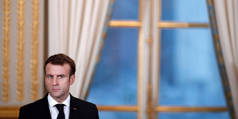
Macron’s Misstep Is Europe’s Loss
The street rallies and riots across France over the past month represent the largest crisis of Emmanuel Macron's presidency, and pose a direct threat to French leadership within the European Union. But while Macron has only himself to blame for the popular backlash, that doesn't mean France or Europe would be better off without him.
PARIS – Are the Yellow Vest protests across France as consequential as the mass rallies of May 1968? It is too soon to say. The revolt has forced French President Emmanuel Macron to make significant and costly concessions, but it is hardly a new French Revolution. Though some demonstrators clearly want to reenact the “feats” of their ancestors against their (elected) monarch, we are not in July 1789.
The uprising of May 1968, it is worth recalling, was driven largely by a bored generation of students living at the peak of France’s post-war prosperity. Though the economy was at full employment, they rebelled against the status quo in the name of dubious utopias inspired by Fidel Castro’s Cuba and Mao’s China. They were joined by well-organized trade unions that helped the movement reach a critical mass, at least temporarily.
The difference between then and now is that those taking to the streets to protest against Macron’s proposed fuel-tax increase are animated not by utopia but by despair. In this sense, the Yellow Vest uprising is not unlike a French Brexit, in that it amounts to an act of shooting oneself in the foot. Whereas the British resorted to the ballot box, the French have adopted a mixture of barricades, marches, and stone throwing.
In either case, everyone seems to lose out. Just as Great Britain’s break from the European Union will leave both parties diminished, France’s domestic upheaval could undercut European integration. Under Macron, France was supposed to keep the flame of liberal democracy alive in a world darkened by Donald Trump’s America, Viktor Orbán’s Hungary, and Matteo Salvini’s Italy. With German Chancellor Angela Merkel’s own leadership slipping, France looked like an island of hope in a sea of Western despair. That is clearly no longer the case.
One senses in British and American media coverage of the Yellow Vest protests a degree of schadenfreude. The proud nation with the arrogant leader has been knocked down a peg; it turns out that the French are no different from anyone else.
The Yellow Vest revolt has been driven in part by Macron’s mistakes. In pursuing radical but necessary reforms, he has been counting on stronger economic growth to vindicate him. But growth has not materialized, and that makes an ecologically motivated fuel tax impossible for middle- and lower-class French commuters to accept.
Making matters worse, Macron launched his reform agenda by slashing France’s wealth tax, a move that won him the sobriquet “President of the Rich.” Yet, because Macron had cut himself off from the country’s “corps intermédiaires” – including mayors, regional representatives, and trade unions – it took him far too long to see that the anger in France’s provinces, small towns, and rural areas was coming to a boil. By surrounding himself with a court of bright young technocrats, Macron lost contact with what he calls “his people” (a rather tone-deaf formulation in itself).
This is a longstanding problem with the French meritocracy. When I was teaching at the National School of Administration in the 1980s, I saw the “happy few” who had passed the school’s highly selective entry exams being awarded their own cars and personal drivers. Imagine receiving this treatment as a 20-year-old intern in one of France’s Prefectures. No wonder they operate as if the state is at their service, rather than the other way around.
Macron’s own personality may also have been a decisive factor in this first major crisis of his presidency. Macron is an exceptionally intelligent, energetic, and courageous person, but he seems to lack the maturity and humility that come with age. He was so eager to restore to the French presidency the dignity that had been lost under his two predecessors – Nicolas Sarkozy and François Hollande – that he went too far in the opposite direction.
If you want to impress Russian President Vladimir Putin or other foreign dignitaries, hosting them in such a magisterial setting as Versailles is sure to prove effective. But reveling in the country’s monarchical history can be dangerous. Many of those who voted for Macron may have been hoping for a twenty-first-century Bonaparte. But now they may be thinking more of Louis XVI, the king who paid with his life for the faults of his predecessors.
Can Macron learn from his mistakes and regain the confidence of French voters who have felt humiliated by him? It will not be easy, but it is not impossible. At any rate, one should not write off prematurely a politician of such vision and ambition.
Rather than rejoicing in a bold leader’s comeuppance, those who still believe in democracy should be thinking about what it would mean if Macron fails. Italy’s present would become France’s future, and the populists who come to power in Paris would probably put an end to the entire European project.
That is not an outcome anyone should wish for. For better or worse, Macron still represents European democracy’s best bulwark against a wave of populist nationalism.

Europe in Disarray
In what by historical standards constitutes an instant, the future of democracy, prosperity, and peace in Europe has become uncertain. And with the US under President Donald Trump treating its allies like enemies, the continent must confront the growing threats it faces largely on its own.
NEW YORK – It was not all that long ago – just a few years, as hard as that it is to believe – that Europe appeared to be the part of the world most closely resembling the end-of-history idyll depicted by Francis Fukuyama at the end of the Cold War. Democracy, prosperity, and peace all seemed firmly entrenched.
Not anymore. Parts of Paris are literally burning. The United Kingdom is consumed and divided by Brexit. Italy is led by an unwieldy left-right coalition that is resisting EU budget rules. Germany is contending with a political realignment and in the early phases of a transition to a new leader. Hungary and Poland have embraced the illiberalism seen across much of the world. Spain is confronting Catalan nationalism. And Russia is committing new acts of aggression against Ukraine.
In what by historical standards constitutes an instant, the future of democracy, prosperity, and peace in Europe has become uncertain. Much of what had been widely assumed to be settled is not. NATO’s rapid demobilization after the Cold War looks premature and precipitous.
There is no single explanation for these developments. What we are seeing in France is populism of the left, the result of people having difficulty making ends meet and rejecting new taxes, whatever the justification for them. This is different from what has fueled the rise of the far right across Europe: cultural defensiveness amid local and global challenges, above all immigration.
The European Union, for its part, has gradually lost its hold on the public imagination. It has been too remote, too bureaucratic, and too elite-driven for too long. Meanwhile, renewed Russian aggression may simply reflect President Vladimir Putin’s judgment that, having realized large political returns on his previous military “investments” in Ukraine and Syria, he had little to fear or lose from further actions.
Europe’s political class deserves its share of responsibility for today’s growing disarray. The EU introduced a common currency without a fiscal or banking union, making it all but impossible to conduct a coherent economic policy. The decision to put the UK’s continued EU membership to a popular vote, while allowing a simple majority to decide the issue and failing to spell out the terms of departure, was misguided.
Likewise, opening Germany’s borders to a flood of refugees, however pure Chancellor Angela Merkel’s motives, was sure to trigger a backlash. Most recently, French President Emmanuel Macron did himself no favors by backing down to the “Yellow Vest” protesters and offering compromises more likely to fuel additional demonstrations and exacerbate his country’s budget predicament.
We should not assume things will get better. It is only a matter of time before France’s far-right National Rally (formerly the National Front) and political parties across Europe figure out how to combine economic and cultural populism and threaten the post-World War II political order. Italy’s hybrid populist government is a version of just that.
The UK will remain torn over its relationship (or lack thereof) with the EU no matter what comes of Brexit; and it is entirely possible that a post-Brexit UK might come under serious strain itself, given renewed calls for Irish unity and Scottish independence. There is no formula for dividing power between Brussels and capitals that would be acceptable to both the EU and national governments. Meanwhile, it is far from certain that Putin is content or done with his aggression against Ukraine or conceivably others.
Moreover, in a world of increasing inequality, violence within and between countries, and climate change, the pressures posed by immigration are more likely to worsen than fade away. And economic dislocation is bound to intensify in a world of global competition and new technologies that will eliminate millions of existing jobs.
Why this matters should be obvious. Europe still represents a quarter of the world’s economy. It is the largest constellation of democratic countries. The last century demonstrated more than once the cost of a breakdown of order on the continent.
Alas, just as there is no single cause that explains Europe’s increasing disarray, there is no single solution either. To be precise, there is no solution of any sort. There is, however, a set of policies that, if adopted, would help leaders manage the challenges.
A comprehensive immigration strategy that balances security, human rights, and economic competitiveness is one such policy. A defense effort that focuses more on how money is spent than on how much is needed would go a considerable way in buttressing Europe’s security. Moreover, deterrence should be strengthened by bolstering NATO and further arming Ukraine. Weaning Europe from Russian natural gas makes sense as well, which implies halting the Nord Stream II pipeline that is meant to bring gas directly from Russia to Germany, bypassing Ukraine. And additional retraining programs are needed for workers whose jobs will disappear as a result of globalization and automation.
Much of this agenda would benefit from American involvement and support. It would help if the United States stopped viewing the EU as an enemy and NATO allies as free-riders. Europe includes the countries most prepared to work with the US to deter Russian aggression; integrate China into global trade and investment frameworks on terms consistent with Western interests; mitigate and, where necessary, adapt to climate change; and set rules of the road for cyberspace.
Alas, such an approach is unlikely to be forthcoming from Donald Trump any time soon. That leaves Europe with no choice but to confront its disarray mostly on its own.
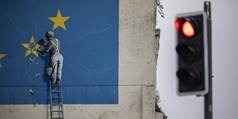
Decision Time for Europe
After muddling through a series of profound crises over the past decade, the EU now finds itself confronted with a political meltdown in Britain, a potential trade war with the US, and mounting security threats on its periphery. To address these and other challenges, Europe will have to make decisions it would rather continue to postpone.
STOCKHOLM – Say what you will against the European Union, but it does not lack ambitions or plans for realizing them. Almost immediately after the June 2016 Brexit referendum, the EU’s 27 other member states agreed to the “Bratislava Roadmap,” charting the course for a future without the United Kingdom. One year later, EU leaders reconvened in Tallinn and adopted a “Leaders’ Agenda” to “guide EU action up until the European Parliament elections in May 2019.” And now, the EU is preparing for a summit in Sibiu, Romania, that same month, where these blueprints will be finalized.
Still, the EU ultimately will be judged on results, not resolutions. Over the past decade, the bloc has faced two profound challenges, and it is now in the process of confronting a third. The first was the euro crisis, which could have ended with the demise of the common currency. Instead, a series of summits were held, and Europe managed to muddle through. With time, member states’ economies started to recover, and new instruments for coordinating economic policy within the eurozone were adopted.
But just when the EU was starting to regain the public’s trust, it was hit by the 2015 refugee crisis, which affected some countries far more than others, exposing glaring inconsistencies in the application of common rules concerning the movement of people. The number of asylum seekers traveling to Europe has since fallen substantially, but fears of a return to 2015 continue to haunt voters. And, more broadly, there is a growing awareness of how conflicts in the Middle East and demographic trends in Africa could threaten European stability.
Now comes the third challenge: the UK’s impending withdrawal from the EU. With Prime Minister Theresa May having so far failed to secure parliamentary support for her negotiated exit deal, Britain is in the midst of a full-scale political crisis, and EU leaders have no choice but to watch from the sidelines as the drama unfolds. A country that once led the world now cannot even lead itself.
With the European Parliament election fast approaching, this is no time for complacency. After the horrors of the Brexit referendum and Donald Trump’s election in 2016 came a renewal of hope with French President Emmanuel Macron’s election in 2017. But in 2018, Europe’s prospects reverted to a state of deep uncertainty – nowhere more so than in France itself. There can be no telling what 2019 will bring.
What we do know is that governance across the EU is becoming more challenging as large mainstream political parties lose support to upstart parties and movements of both the left and the right. In this increasingly fragmented and polarized political landscape, the process of forming national governments has become long and arduous; even Sweden is following this unfortunate new pattern.
Making matters worse, economic growth across the EU appears to be slowing – and that was even before the eruption of mass protests in France and Italy’s confrontation with the EU over its proposed budget. Whereas Italy’s populist government has sought to blame the country’s problems on the EU bureaucracy in Brussels, Macron has responded to public concerns by calling for even stronger EU institutions.
But both perspectives elide the fact that change will depend on politically painful domestic reforms. And besides, regardless of how long Chancellor Angela Merkel remains in office, it is already clear that German backing for a “transfer union” is not in the cards. The danger now is that political uncertainty in Germany, France, Italy, and the UK will create an opening for populists and self-declared “illiberal” democrats such as Hungarian Prime Minister Viktor Orbán to build more walls (physically as well as metaphorically) and mobilize the ghosts of nationalism.
Moreover, Europe’s external environment has become more dangerous. Though the world’s attention is currently fixed on the risks of an escalating Sino-American trade war, the threat of an equally destructive transatlantic conflict cannot be ignored. Trump seems genuinely to believe that German cars on the streets of New York pose a threat to US national security. Should he wake up one morning and decide to impose heavy import tariffs on European cars, things could get very ugly, very fast. Many European policymakers, already convinced that the US-based tech giants are a threat to European security, would welcome the opportunity to pursue stronger actions against them. If the US responded in kind, the casualties would pile up quickly.
One also cannot forget the mounting geopolitical and humanitarian challenges on the EU’s periphery. Trump, driven by an obsession with Iran, seems intent on aggravating ongoing conflicts in the Middle East. And it would be absurd to think that Russian President Vladimir Putin will refrain from interfering in Ukraine’s upcoming presidential and parliamentary elections. Russia’s blockade of the Kerch Strait – the entry point to the strategically important Sea of Azov – and military buildup on Crimea indicate that Europe cannot let down its guard.
To manage these and future challenges, the EU will have to redefine itself, starting in 2019. In an increasingly dangerous geopolitical environment, the EU can no longer rely solely on soft power. And, as is the case for all governments, it must start preparing for the digital revolution, or risk punishing costs over the near and long term.
The Bratislava Roadmap, the Leaders’ Agenda, and the upcoming Sibiu summit are all well and good – even necessary. But whereas 2018 was a year of confusion, 2019 will be year for decision-making. European leaders must face up to the brutal realities of a changing world. Only then will voters trust them to forge a new path toward a future of peace and prosperity.
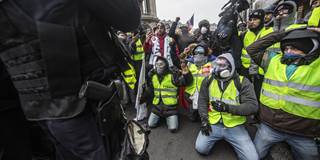
STRASBOURG – The spontaneous street protests in Paris over the past month come almost exactly 50 years after the mass revolt of May 1968. But that is not to say the two events are comparable. Les événements de mai 1968 was an anarchist uprising by students and workers against the traditionalism and apparent authoritarianism of President Charles de Gaulle. Today’s “Yellow Vests,” by contrast, have eschewed intellectual and political debate, and quickly degenerated into a rioting mob.
What started as a decent, middle-class protest against a new tax on diesel fuel has been hijacked by professional thugs and extremists railing against migrants, the European Union, and French President Emmanuel Macron. “Paris is burning,” gloated Steve Bannon, US President Donald Trump’s populist former consigliere, at a recent appearance alongside Marine Le Pen of the far-right National Rally (formerly the National Front). According to Bannon, “The yellow vests … are exactly the same type of people who elected Donald Trump … and who voted for Brexit.”
Worse still, the extremist activism has already spread to neighboring Belgium and the Netherlands, which now have Yellow Vest movements of their own. And in Italy, Matteo Salvini, the xenophobic interior minister, has capitalized on the riots to launch a broadside against Macron’s policies. Never mind that Italy is in even more desperate need of a Macron-style reform agenda than France.
The fact that alt-right agitators are using the Yellow Vest movement as a platform to spew hate and lies should worry all Europeans. In one way or another, many of today’s populist parties and movements draw financial support from the Kremlin. There is a growing body of evidence to suggest that the United Kingdom’s 2016 Brexit referendum was influenced by “dark money” from Russia. And Russian trolls have continued to foment Islamophobic hatred across Western Europe.
The alt-right has been highly successful at exploiting people’s fears to undermine global solutions for global challenges such as migration and climate change. For those struggling to make ends meet, right-wing messaging about refugees and migrants taking jobs and destroying European culture can resonate powerfully. And for rural households facing slightly higher fuel taxes, it is convenient to believe that climate change is just a hoax propagated by political elites and “the media.”
A countermovement against such disinformation is long past due. The first step in stemming the populist, Euroskeptic tide is to tell the truth and point out the lies. But let us not be naive. Countering the alt-right threat to our societies will also require deep reform.
A common populist criticism of the EU is that it functions opaquely and often incomprehensibly. Yet, if anything, the EU tends to be rather weak in the face of global challenges. Contrary to populists’ claims of overreach, European institutions almost always do “too little, too late.” That must change, and radically so. We need to make the EU far more democratic, transparent, and effective – which is to say, more sovereign – than it is today.
This does not require us to reinvent the wheel. We need only return to the ideas of Europe’s founding fathers: Jean Monnet, Paul-Henri Spaak, Robert Schuman, Alcide de Gasperi, and others. These leaders had a clear vision of a simpler yet stronger Union, led not by a 28-member commission, but by a real government with 12 ministers. They would have allowed Europeans to vote directly for a parliament with full competencies and legislative authority, and without the system of unanimity that has allowed rogue member states such as Hungary to tie the entire bloc’s hands.
Above all, we must not equate liberal democracy with the status quo, which all but ensures slow, arduous decision-making. If the EU suddenly were to make collective decisions by simple majority, the problems confronting it would no longer seem intractable. Europe would finally be able to stand on its own and address its citizens’ concerns.
For example, with a European army serving as an autonomous pillar within NATO, the EU would no longer have to defer to the US on security decisions. With a single European digital market, European alternatives to Google, Facebook, Amazon, Samsung, and Huawei could finally emerge. And with a European border patrol and coast guard, Europeans would be far less reliant on Turkey, Russia, and others when it comes to managing migration flows.
Of course, controlling our borders does not mean closing ourselves off from the outside world. Europe will always need to engage with other powers. But it must do so from a position of strength.
If the EU can rediscover its democratic potential, the alt-right will no longer have grounds on which to launch attacks against international cooperation and multilateralism. In a more democratic Europe, citizens who took to the streets would do so not to scapegoat migrants and journalists, but to demand solutions for the real challenges we face.
Before it was co-opted, the yellow vest movement was based on a genuine concern about economic security. The lesson for all EU member states is that we must shore up our national social-security systems, while moving forward on EU-level reforms. With a full-fledged banking union, citizens’ savings would be secured, and taxpayers would not end up on the hook for private-sector profligacy. And with a complete monetary union and an autonomous joint budget, the eurozone would be far more resilient in the event of another financial crisis.
Until Europe gets serious about economic reforms, our economy will continue to underperform structurally vis-à-vis the rest of the world. Since 2010, the average annual growth rate in the euro area has been 1.3%, compared to 2.3% in the United States. This gap represents €1.2 trillion ($1.4 trillion) from 2010-2018, or approximately €500 billion lost in terms of tax revenue. For France alone, this amounts to €10 billion every year – the budgetary cost of what Macron recently proposed to meet the Yellow Vests’ original demands.
The uprising that Europe needs will not happen in the streets of Paris or Brussels, but within the EU’s paralyzed institutions. For more than five decades, power within Europe has been divided between conservatives and socialists who, collectively, have failed to address the challenges of the day.
It is time to leave the European talking shop behind us. The current era demands action. In the May 2019 European Parliament election, “Generation Europe” can break the old political order and take the revolution out of the streets and into the hallways of European democracy.